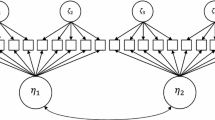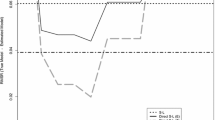Abstract
A general index of reliability, termed “canonical reliability,” is developed for use with profiles, or more generally, for use with vectors of random variables. Canonical reliability is defined as the ratio of the average squared distance among true scores to the average squared distance among observed scores. Based on Mahalonobis distances, canonical reliability is shown to be consistent with multivariate analogues of parallel form correlations, squared correlation between true and observed scores, and an analysis of variance formulation. The index of reliability based on Cronbach and Gleser'sD 2 is also derived from the general formulation. A comparison of the Mahalonobis andD 2 approaches indicates that score vectors usingD 2 distances are more reliable; however, both methods of comparing profiles are useful depending on the nature of the information that is desired. Transforming the observed variables to independent canonical variates provides a basis for comparing profiles on maximally reliable profile dimensions. For illustrative purposes, profile reliability is calculated and interpreted for the WISC subscales for a 7 1/2 year age group.
Similar content being viewed by others
References
Bock, R. D. Contributions of multivariate experimental designs to educational research. In R. B. Cattell (Ed.)Handbook of Multivariate Experimental Psychology, Chicago: Rand McNally, 1966, 820–840.
Cattell, R. B.r p and other coefficients of pattern similarity.Psychometrika, 1949,14, 279–298.
Cohen, J.r e : a profile similarity coefficient invariant over variable reflection.Psychological Bulletin, 1969,71, 281–284.
Conger, A. J. Estimating profile reliability and maximally reliable composities.Multivariate Behavioral Research, in press.
Cronbach, L. J. & Gleser, G. C. Assessing similarity between profiles.Psychological Bulletin, 1953,50, 456–473.
Cronbach, L. J., Gleser, G. C., Nanda, H., and Rajaratnam, N.The Dependability of Behavioral Measurements. New York: Wiley, 1972.
Gaier, E. L. & Lee, M. C. Pattern analysis: the configural approach to predictive measurement.Psychological Bulletin, 1953,50, 140–148.
Graybill, F. A.Introduction to Matrices with Applications in Statistics. Belmont, California: Wadsworth, 1969.
Guttman, L. A basis for analyzing test retest reliability.Psychometrika, 1945,10, 255–282.
Harris, C. W. Characteristics of two measures of profile similarity.Psychometrika, 1955,20, 289–297.
Hoyt, C. Test reliability estimated by analysis of variance.Psychometrika,6, 153–160.
Lord, F. M. & Novick, M. R.Statistical theories of mental test scores. Reading, Massachusetts: Addison-Wesley, 1968.
Nunnally, J. The analysis of profile data.Psychological Bulletin, 1962,59, 311–319.
Osgood, C. E. & Suci, G. A measure of relation determined by both mean difference and profile information.Psychological Bulltin, 1952,59, 251–262.
Overall, J. Note on multivariate methods for profile analysis.Psychological Bulletin, 1964,61, 195–198.
Tellegen, A. Direction of measurement: a source of misinterpretation.Psychological Bulletin, 1965,63, 233–243.
Webster, H. A note on profile similarity.Psychological Bulletin, 1952,49, 538–539.
Wechsler, D.Wechsler Intelligence Scale for Children Manual. New York: The Psychological Corporation, 1949.
Winer, B. J.Statistical Principles in Experimental Design. New York: McGraw-Hill, 1962.
Author information
Authors and Affiliations
Additional information
This research was supported in part by a PHS Research Grant No. HM-10006 from the National Institute of Mental Health, Public Health Service and in part by a Science Development Grant No. GU-2059 from the National Science Foundation.
The authors thank Dr. Elliot Cramer for many useful suggestions and Dr. Judith Conger for a careful reading of the manuscript. Requests for reprints should be sent to Anthony J. Conger, Psychology Department, Duke University, Durham, N. C., 27706.
Rights and permissions
About this article
Cite this article
Conger, A.J., Lipshitz, R. Measures of reliability for profiles and test batteries. Psychometrika 38, 411–427 (1973). https://doi.org/10.1007/BF02291663
Received:
Revised:
Issue Date:
DOI: https://doi.org/10.1007/BF02291663




